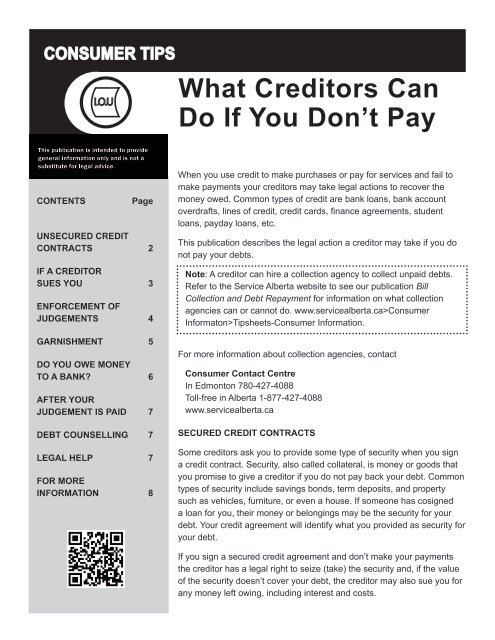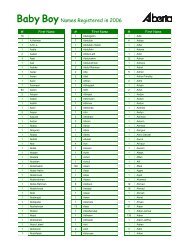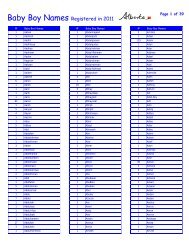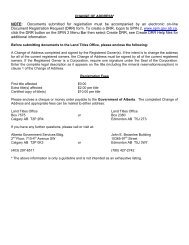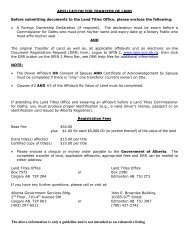What Creditors Can Do If You Don't Pay - Service Alberta
What Creditors Can Do If You Don't Pay - Service Alberta
What Creditors Can Do If You Don't Pay - Service Alberta
Create successful ePaper yourself
Turn your PDF publications into a flip-book with our unique Google optimized e-Paper software.
CONSUMER TIPS<br />
This publication is intended to provide<br />
general information only and is not a<br />
substitute for legal advice.<br />
CONTENTS Page<br />
UNSECURED CREDIT<br />
CONTRACTS 2<br />
IF A CREDITOR<br />
SUES YOU 3<br />
ENFORCEMENT OF<br />
JUDGEMENTS 4<br />
GARNISHMENT 5<br />
DO YOU OWE MONEY<br />
TO A BANK? 6<br />
AFTER YOUR<br />
JUDGEMENT IS PAID 7<br />
DEBT COUNSELLING 7<br />
LEGAL HELP 7<br />
FOR MORE<br />
INFORMATION 8<br />
<strong>What</strong> <strong>Creditors</strong> <strong>Can</strong><br />
<strong>Do</strong> <strong>If</strong> <strong>You</strong> <strong>Do</strong>n’t <strong>Pay</strong><br />
When you use credit to make purchases or pay for services and fail to<br />
make payments your creditors may take legal actions to recover the<br />
money owed. Common types of credit are bank loans, bank account<br />
overdrafts, lines of credit, credit cards, finance agreements, student<br />
loans, payday loans, etc.<br />
This publication describes the legal action a creditor may take if you do<br />
not pay your debts.<br />
Note: A creditor can hire a collection agency to collect unpaid debts.<br />
Refer to the <strong>Service</strong> <strong>Alberta</strong> website to see our publication Bill<br />
Collection and Debt Repayment for information on what collection<br />
agencies can or cannot do. www.servicealberta.ca>Consumer<br />
Informaton>Tipsheets-Consumer Information.<br />
For more information about collection agencies, contact<br />
Consumer Contact Centre<br />
In Edmonton 780-427-4088<br />
Toll-free in <strong>Alberta</strong> 1-877-427-4088<br />
www.servicealberta.ca<br />
SECURED CREDIT CONTRACTS<br />
Some creditors ask you to provide some type of security when you sign<br />
a credit contract. Security, also called collateral, is money or goods that<br />
you promise to give a creditor if you do not pay back your debt. Common<br />
types of security include savings bonds, term deposits, and property<br />
such as vehicles, furniture, or even a house. <strong>If</strong> someone has cosigned<br />
a loan for you, their money or belongings may be the security for your<br />
debt. <strong>You</strong>r credit agreement will identify what you provided as security for<br />
your debt.<br />
<strong>If</strong> you sign a secured credit agreement and don’t make your payments<br />
the creditor has a legal right to seize (take) the security and, if the value<br />
of the security doesn’t cover your debt, the creditor may also sue you for<br />
any money left owing, including interest and costs.
2<br />
CONSUMER TIPS<br />
In some cases, the court may also allow the creditor<br />
to garnishee your wages and your bank account.<br />
Note: Legal costs can be very expensive. Talk to<br />
your creditors or their representative to see if you<br />
can negotiate new payment arrangements and stop<br />
legal action. Ensure any agreement you negotiate<br />
is in writing and signed by both parties.<br />
Seizure under a secured contract<br />
A creditor must use a civil enforcement agency to<br />
seize the security. A civil enforcement bailiff, working<br />
with the agency will carry out the seizure.<br />
<strong>You</strong> will have a chance to get your security back. The<br />
creditor must give you 20 days notice before selling<br />
your security. To get it back, you will have to pay the<br />
money you owe from the missed payments, as well as<br />
the administrative costs of the seizure. <strong>You</strong> may also<br />
have to pay the full amount of the debt. <strong>If</strong> you cannot<br />
pay, the creditor has the right to sell the security.<br />
Note: Seizure under a secured credit contract is<br />
not the same as seizure under an unsecured credit<br />
contract. For more information refer to “Seizure<br />
under a writ of enforcement”.<br />
Conditional sales contracts<br />
A conditional sales contract is a special type of<br />
secured contract. When you buy goods under a<br />
conditional sales contract the creditor owns the<br />
goods until you pay the debt in full. The goods are<br />
the security for the contract. For example if you buy a<br />
car from a car dealership and sign a conditional sales<br />
contract you can drive the car off the lot immediately,<br />
but the car is the security and you are not really the<br />
owner until you make your last payment. <strong>If</strong> you don’t<br />
make your payments, the dealer may seize the car.<br />
With a conditional sales contract, if you don’t make<br />
your payments as agreed, the creditor may either<br />
seize the goods that you bought on the conditional<br />
sales contract, or sue you to get a judgement for the<br />
amount that you owe.<br />
Quit claims<br />
<strong>If</strong> you don’t make your payments the creditor may<br />
ask you to sign a quit claim in which you agree to<br />
voluntarily give the security back to the creditor. <strong>If</strong> you<br />
do this there is no need for the creditor to use a civil<br />
enforcement agency (bailiff) to seize the security.<br />
Note: <strong>If</strong> the creditor sells the security but does not<br />
receive enough money to pay your debt in full, you<br />
could still be responsible for the balance. <strong>You</strong> have<br />
no guarantee that the creditor will sell the security<br />
for more than what you owe. <strong>If</strong> the creditor sells<br />
the security and receives more than the balance of<br />
your debt the difference must be paid to you.<br />
UNSECURED CREDIT CONTRACTS<br />
With an unsecured credit agreement, you get<br />
credit without promising security to the creditor. For<br />
example, you sign an unsecured credit contract when<br />
you get a credit card or a payday loan. <strong>You</strong> have an<br />
unsecured credit agreement with the utility company<br />
when they connect your gas, power, water or phone.<br />
<strong>You</strong> also have an unsecured agreement with your<br />
dentist for dental care.<br />
Unsecured creditors can sue you if you don’t pay your<br />
bills.
Note: <strong>If</strong> you don’t pay your utility bill, the utility<br />
company will probably cut off your services and<br />
start legal action to get the money you owe. To<br />
have the service reconnected, you will have to pay<br />
your outstanding debt, a late penalty, a hook-up fee<br />
and a deposit.<br />
IF A CREDITOR SUES YOU<br />
A creditor has the option of suing you in the Civil<br />
Division of Provincial Court (formerly known as small<br />
claims court) or the Court of Queen’s Bench.<br />
Civil Division of Provincial Court<br />
<strong>If</strong> your debt is $25,000 or less, your case will probably<br />
be heard in this court. <strong>You</strong> may hire a lawyer to<br />
represent you or you may represent yourself.<br />
<strong>If</strong> you are sued you will be served with a civil claim.<br />
The creditor (or a representative of the creditor)<br />
will serve the claim on you where you usually live.<br />
It can also be served on any adult resident in your<br />
household that is at least 16 years of age. The claim<br />
can also be sent by registered mail. The claim will tell<br />
you who is suing you, why they are suing, and how<br />
much money they are suing you for.<br />
<strong>Do</strong>n’t ignore the claim. <strong>If</strong> you do not take any action<br />
your creditor can get a default judgement from the<br />
court that would allow them to garnishee your wages,<br />
bank account or have your property seized.<br />
<strong>What</strong> you can do:<br />
1. Talk to your creditor.<br />
<strong>You</strong> might be able to negotiate a payment plan<br />
you can handle and to which your creditor will<br />
agree. Make sure any agreement you negotiate is<br />
in writing and signed by both parties. The creditor<br />
should immediately inform the Civil Division of<br />
Provincial Court in writing that the matter has<br />
been settled.<br />
<strong>What</strong> <strong>Creditors</strong> <strong>Can</strong> <strong>Do</strong> if <strong>You</strong> <strong>Can</strong>’t <strong>Pay</strong><br />
2. <strong>Pay</strong> the claim.<br />
<strong>You</strong> can pay the claim and related costs to<br />
the court, or directly to the creditor or his<br />
representative. Make sure you get a receipt.<br />
The court will only accept payment by cash,<br />
certified cheque, money order or debit card where<br />
available. <strong>You</strong> will not have to appear before a<br />
judge if you choose this action.<br />
3. File a dispute note.<br />
<strong>You</strong> will receive a form called a dispute note when<br />
you receive your civil claim. <strong>If</strong> you believe there<br />
are facts in your favour and you want to object to<br />
the creditor’s claim, you can complete the dispute<br />
note and deliver it personally, by fax, or by mail<br />
to the Court office where the civil claim was filed.<br />
Lack of money is not a valid reason to dispute the<br />
claim.<br />
<strong>If</strong> you receive a civil claim in <strong>Alberta</strong>, you have 20<br />
calendar days from the time you are served to file the<br />
dispute note. <strong>If</strong> the claim is served on you outside<br />
<strong>Alberta</strong> you will have one month to respond. The<br />
Court office must receive the dispute note within the<br />
correct time limit. Once the note is filed, the clerk of<br />
the court will let you and the creditor know when the<br />
hearing will be. At the hearing a judge will decide if the<br />
creditor has a valid claim.<br />
<strong>If</strong> you don’t file a valid dispute note within the required<br />
time or appear in court on the day of the hearing, the<br />
court will award the creditor with a judgement against<br />
you.<br />
<strong>If</strong> you are sued you<br />
will be served with<br />
a civil claim. <strong>Do</strong>n’t<br />
ignore the claim.<br />
3
4<br />
CONSUMER TIPS<br />
Court of Queen’s Bench<br />
<strong>If</strong> your debt is $25,000 or more the case will be heard<br />
in the Court of Queen’s Bench. The creditor or a<br />
representative of the creditor will deliver a statement<br />
of claim to you in person, or by registered mail. <strong>You</strong><br />
have 20 calendar days to respond. Because of the<br />
large amount of money involved you should consult a<br />
lawyer.<br />
ENFORCEMENT OF JUDGEMENTS<br />
The court will award a judgement to a creditor if the<br />
judge decides that the creditor’s claim is valid. This<br />
judgement is enforceable for 10 years and it can be<br />
renewed. Interest is charged on an unpaid judgement.<br />
It is calculated from the date of the judgement. While<br />
a judgement issued in an <strong>Alberta</strong> court can only<br />
be enforced in <strong>Alberta</strong>, a creditor may transfer the<br />
judgement to other provinces. So even if you move to<br />
another province, a creditor can pursue you to collect<br />
a judgement debt.<br />
Once a judgement is granted the creditor can take<br />
several steps to get the money that you owe:<br />
1. Register a writ of enforcement with the<br />
Personal Property Registry.<br />
2. Garnishee your wages, bank accounts or<br />
accounts receivable.<br />
3. Seize your property.<br />
Writ of enforcement<br />
To start enforcement procedures the creditor must file<br />
a writ of enforcement with the Court of Queen’s Bench<br />
and then register it in the Personal Property Registry.<br />
<strong>If</strong> several creditors have judgements against you,<br />
each one may file a writ. <strong>If</strong> one creditor seizes your<br />
property, or garnishees your wages or bank account,<br />
all creditors with writs against you will receive a share<br />
of the money from the seizure or the garnishment.<br />
<strong>If</strong> you own a house or land, a creditor with a<br />
judgement against you can file a writ of enforcement<br />
against the title to your property at the Land Titles<br />
Office. <strong>You</strong> will have difficulty selling or mortgaging<br />
your property until the judgement is settled.<br />
Seizure under a writ of enforcement<br />
After registering a writ of enforcement, a creditor must<br />
use a civil enforcement agency to seize your personal<br />
property to pay the judgement debt plus interest and<br />
costs. The civil enforcement bailiff can seize personal<br />
property such as vehicles and furniture. However,<br />
there are certain belongings that the bailiff cannot<br />
seize under a writ of enforcement. (See “<strong>What</strong> cannot<br />
be seized”.)<br />
When the bailiff seizes your property you will be given<br />
a copy of the Notice of Seizure, a Notice of Objection<br />
and a form called Information for Debtor. The bailiff<br />
may remove the seized property or leave it with you<br />
under an arrangement called a baillee’s undertaking.<br />
<strong>If</strong> the property is left with you it is under the condition<br />
that you agree not to sell, remove or damage it.<br />
After the bailiff gives you the seizure documents, you<br />
have 15 calendar days to give a notice of objection<br />
to the civil enforcement agency that conducted the<br />
seizure. The notice must give the reasons for your<br />
objection. <strong>You</strong>r property then cannot be sold without<br />
a court order. <strong>You</strong> will be notified of the court date for<br />
hearing your objection. <strong>If</strong> you don’t file an objection,<br />
or make arrangements to pay your debt, the creditor<br />
may instruct the civil enforcement agency to sell the<br />
seized property by any commercially reasonable<br />
method.
<strong>Can</strong> you stop a seizure?<br />
Talk to your creditor immediately. <strong>If</strong> you can start<br />
paying some of the money that you owe, the creditor<br />
may leave the seized property with you. <strong>You</strong> and the<br />
creditor may agree to a new payment plan. <strong>If</strong> you<br />
can’t agree, the creditor will probably continue with<br />
the seizure. Most creditors want to collect the money<br />
that you owe them as quickly as possible, so would<br />
rather not take legal action.<br />
<strong>What</strong> cannot be seized<br />
Under <strong>Alberta</strong>’s Civil Enforcement Act, you have the<br />
right to keep certain property. In most cases, you<br />
may keep<br />
• household furnishings and appliances worth up to<br />
$4,000<br />
• a motor vehicle up to a value of $5,000<br />
• personal property that you need to earn your<br />
livelihood, up to a value of $10,000<br />
• up to $40,000 of the equity on the title of the<br />
house that you own and live in (equity is the<br />
difference between the market value of your home<br />
and any outstanding mortgages). <strong>If</strong> the equity<br />
is more than $40,000, the creditor can move to<br />
sell the house. <strong>You</strong> would then be allowed to<br />
keep up to $40,000 of any money left after the<br />
mortgage is paid in full. This $40,000 is reduced<br />
proportionately where the title to the property is<br />
held jointly (e.g. in the case of two joint tenants,<br />
the exemption for each is $20,000).<br />
Note: <strong>If</strong> you promised any specific items as<br />
security on a loan or have a conditional sales<br />
contract, those items can be seized if you do not<br />
make your loan payments. The amounts listed<br />
above do not apply.<br />
<strong>What</strong> <strong>Creditors</strong> <strong>Can</strong> <strong>Do</strong> if <strong>You</strong> <strong>Can</strong>’t <strong>Pay</strong><br />
GARNISHMENT<br />
Garnishment is a legal procedure that a creditor can<br />
take after the court awards a judgement against<br />
you. The creditor asks the court to take the money<br />
(garnishee) you owe from a number of sources like<br />
• your pay cheque<br />
• your account at a financial institution such as a<br />
bank, treasury branch, trust company or credit<br />
union<br />
• accounts receivable (money owing to you by<br />
others).<br />
The creditor delivers the garnishee summons to your<br />
employer or financial institution. The creditor can<br />
garnishee your wages or money in your bank account,<br />
up to the amount of your total judgement debt plus<br />
costs. <strong>You</strong>r employer or financial institution pays the<br />
money to the court and the court pays the money to<br />
the creditors.<br />
<strong>If</strong> there is not enough money available to cover your<br />
debt on the day the garnishee summons is served<br />
the creditor will continue to garnishee your wages or<br />
accounts until your debt is paid in full.<br />
A garnishee summons is effective for 60 days against<br />
a bank account, and is effective for one year in most<br />
other cases. The garnishee must be renewed at that<br />
time.<br />
<strong>You</strong>r employer, financial institution or creditor will give<br />
you a copy of the garnishee summons within 15 days<br />
of the date it is served.<br />
Wage garnishment<br />
<strong>If</strong> your wages are garnisheed, you will be allowed to<br />
keep a certain amount of money each month to pay<br />
for your basic expenses:<br />
5
6<br />
CONSUMER TIPS<br />
• For a debtor with no dependents, the minimum<br />
exemption is $800 net per month and the<br />
maximum is $2,400 net. <strong>Creditors</strong> can take onehalf<br />
the amount between the $800 minimum<br />
exemption and the $2,400 maximum exemption<br />
and 100 percent of employment earnings greater<br />
than $2,400.<br />
• For a debtor with one or more dependents, the<br />
minimum and maximum exemptions both increase<br />
by $200 for each dependent.<br />
These amounts are calculated from total earnings less<br />
income tax, <strong>Can</strong>ada Pension Plan contributions and<br />
Employment Insurance contributions.<br />
Note: The Fair Trading Act prohibits the<br />
assignment of wages to a creditor from an<br />
employer. <strong>You</strong>r employer must pay you the full<br />
amount of your owed wages, then you have control<br />
over the use of those wages. A creditor that<br />
attempts to induce a person or employer to enter<br />
into a wage assignment may be in breach of the<br />
legislation.<br />
<strong>If</strong> your debt is for unpaid child support or alimony<br />
under a court order, you will not be allowed to keep<br />
these amounts. Clients can call the <strong>Alberta</strong> Justice<br />
Maintenance Enforcement Program (MEP) Info Line<br />
by calling 780-422-5555 in Edmonton or dial<br />
310-0000 for toll-free access anywhere in <strong>Alberta</strong>.<br />
Clients should have their seven digit MEP account<br />
number and Personal Identification Number (PIN)<br />
available when using the Internet service or calling.<br />
Bank account garnishment<br />
A creditor who garnishees your bank account is<br />
allowed to take the entire amount of money that you<br />
owe. This means that all money you have on deposit<br />
at your financial institution can be taken. The creditor<br />
does not have to leave you anything.<br />
Joint accounts can be garnisheed. The money<br />
taken from this type of account will be pro-rated by<br />
the court based on the number of account holders.<br />
Garnishment of a joint account is only valid for one<br />
garnishee. The creditor will have to re-issue the<br />
garnishee if they want to continue to garnishee the<br />
joint account.<br />
<strong>If</strong> your employer deposits your wages directly into<br />
your bank account, that money is considered to be<br />
a bank deposit. It can all be garnisheed. <strong>If</strong> you are<br />
in this situation you can apply to the Court for an<br />
order that will grant you the same exemptions you<br />
would have been entitled to if the garnishee had been<br />
served on your employer.<br />
Special rules apply if the only money kept in a bank<br />
account is from income support payments under the<br />
Income and Employment Supports Act, a handicap<br />
benefit paid under the Assured Income for the<br />
Severely Handicapped Act, or a widow’s pension<br />
under the Widows’ Pension Act. <strong>You</strong>r bank account<br />
cannot be garnisheed if the only money in the account<br />
is from one of these types of payments. <strong>If</strong> you deposit<br />
other money in this account it could be garnisheed.<br />
Objection to a garnishment<br />
To stop the garnishment process or to make changes<br />
to the garnishment by the creditor, you must obtain a<br />
court order. <strong>You</strong> will probably need a lawyer to do so.<br />
DO YOU OWE MONEY TO A BANK?<br />
<strong>If</strong> you have an overdue debt owing to a bank, the<br />
bank can use its right of set-off to recover the money.<br />
The right of set-off allows a bank to withdraw money<br />
from your accounts to pay your overdue debt. The<br />
bank does not have to give you notice or ask your<br />
permission before taking this action. The bank does<br />
not have to ask the permission of the court.
Banks may use their right of set-off to collect overdue<br />
payments on credit cards, loans, overdrafts or lines<br />
of credit. A bank may withdraw money that you have<br />
on deposit in any of its branches and apply it to your<br />
debt. The bank does not have to leave any money in<br />
your account.<br />
AFTER YOUR JUDGEMENT IS PAID<br />
Once you have paid a judgement in full, the<br />
judgement should be discharged at the Court of<br />
Queen’s Bench and at the Personal Property Registry.<br />
Check to make sure this is done. It’s also a good idea<br />
to let the credit bureau know that you have paid the<br />
debt. They will enter this information on your credit<br />
record.<br />
For more information refer to the <strong>Service</strong> <strong>Alberta</strong><br />
publication <strong>You</strong>r Credit Report.<br />
www.servicealberta.ca>Consumer Information><br />
Tipsheets-Consumer Information><strong>You</strong>r Credit Report.<br />
Phone: Edmonton 780-427-4088<br />
Toll-free in <strong>Alberta</strong>: 1-877-427-4088<br />
Judgements are recorded on your credit file. The<br />
information will remain on your file for six years after<br />
the judgement has been paid in full. Businesses<br />
may not be willing to give you credit if you have a<br />
judgement on your record.<br />
DEBT COUNSELLING<br />
Money Mentors, formerly Credit Conselling <strong>Service</strong>s<br />
of <strong>Alberta</strong>, is a not-for-profit consumer debt<br />
counselling service that offers a number of debt<br />
repayment options.<br />
Money Mentors is the only organization in <strong>Alberta</strong><br />
legislated to provide the Orderly <strong>Pay</strong>ment of Debts<br />
(OPD) program.<br />
<strong>What</strong> <strong>Creditors</strong> <strong>Can</strong> <strong>Do</strong> if <strong>You</strong> <strong>Can</strong>’t <strong>Pay</strong><br />
Under the OPD program, Money Mentors makes<br />
an application on your behalf, to the court, for a<br />
consolidation order. This order will allow you to make<br />
payments, which Money Mentors will distribute pro<br />
rata to your unsecured creditors. A consolidation order<br />
protects you from some legal actions. The interest<br />
rate is reduced to 5%. <strong>Pay</strong>ment schedules are based<br />
on your ability to pay. Most secured credit (such as<br />
property mortgages or car loans) cannot go on OPD.<br />
<strong>If</strong> you choose to go on the program, you can maintain<br />
secured credit payments outside of the OPD program,<br />
but you cannot get any new credit while on OPD.<br />
<strong>If</strong> you default while on OPD, the court will make an<br />
order permitting all registered creditors to proceed<br />
independently to enforce their claims. They do not<br />
have to sue the debtor to proceed with legal action to<br />
collect the debt.<br />
LEGAL HELP<br />
<strong>If</strong> a creditor is taking legal action against you, you may<br />
want legal advice. The following agencies can help.<br />
Calgary Legal Guidance gives legal advice and<br />
assistance to people with low incomes who do not<br />
qualify for Legal Aid. Phone 403-234-9266 in Calgary.<br />
Dial-a-Law offers brief taped explanations of various<br />
aspects of the law. In Calgary, call 403-234-9022.<br />
Elsewhere in <strong>Alberta</strong>, call toll-free 1-800-332-1091.<br />
Lawyer Referral <strong>Service</strong> is a province-wide service<br />
for people who can afford to pay a lawyer but need<br />
help finding one who can meet their particular needs.<br />
The service, operated by the Law Society of <strong>Alberta</strong>,<br />
provides you with the names of three lawyers in your<br />
area. <strong>You</strong> can make an appointment with one of them<br />
and receive an initial half-hour consultation at no cost.<br />
In Calgary, call 403-228-1722. Elsewhere in <strong>Alberta</strong>,<br />
call toll-free 1-800-661-1095.<br />
7
8<br />
CONSUMER TIPS<br />
Legal Aid Society of <strong>Alberta</strong> provides legal help to<br />
people who cannot afford a lawyer. The Society has<br />
offices in Calgary, Edmonton, Fort McMurray, Grande<br />
Prairie, Whitecourt, Lethbridge, Medicine Hat, Peace<br />
River, Red Deer, St. Paul and Wetaskiwin.<br />
Student Legal Assistance at the University of<br />
Calgary offers legal help to people with low incomes.<br />
Phone 403-220-6637 in Calgary.<br />
Student Legal <strong>Service</strong>s at the University of <strong>Alberta</strong><br />
offers legal help to people with low incomes. In<br />
Edmonton phone 780-492-2226.<br />
FOR MORE INFORMATION<br />
Consumer Contact Centre<br />
In Edmonton 780-427-4088<br />
Toll-free in <strong>Alberta</strong> 1-877-427-4088<br />
www.servicealberta.ca<br />
Queen’s Printer Bookstore<br />
<strong>You</strong> may purchase Act(s) and regulation(s) from the<br />
Queen’s Printer Bookstore:<br />
10611 - 98 Avenue, Edmonton, <strong>Alberta</strong> T5K 2P7<br />
Edmonton: 780-427-4952<br />
Toll-free in <strong>Alberta</strong>: Dial 310-0000 then 780-427-4952<br />
These are also free for you to download in the “pdf” or<br />
“html” formats at www.qp.alberta.ca<br />
Money Mentors - OPD Program<br />
Money Mentors provides credit counselling and<br />
money coaching.<br />
Toll-free in <strong>Alberta</strong>: 1-888-294-0076<br />
www.moneymentors.ca<br />
<strong>You</strong> may also find these publications helpful:<br />
• Bill Collection and Debt Repayment has<br />
information about debt programs and options.<br />
• <strong>Pay</strong>day Lending has information about payday<br />
loans.<br />
Find these on our website at www.servicealberta.<br />
ca>Consumer Information>Tipsheets-Consumer<br />
Information<br />
A current version of this and other consumer publications are available at the <strong>Service</strong> <strong>Alberta</strong><br />
website www.servicealberta.ca. Most public libraries have Internet access if you don’t have access<br />
at home. <strong>If</strong> you need more copies of this publication, you have permission to photocopy.<br />
05/12


